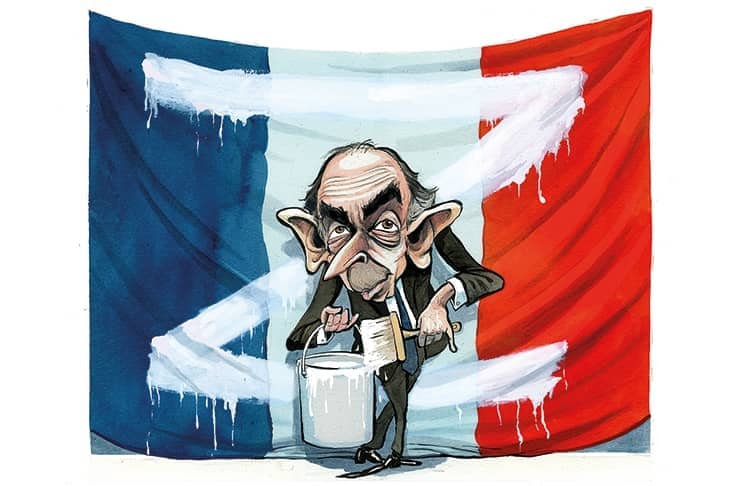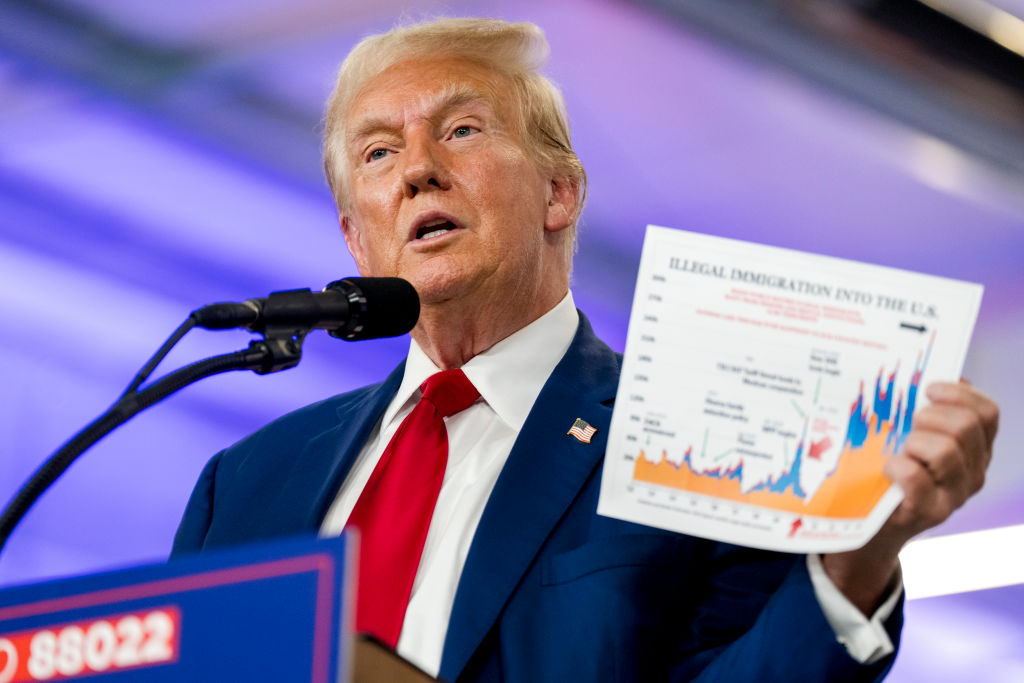London
Éric Zemmour looks down at a copy of The Spectator and cocks his eyebrows at the unflattering cartoon of him on the cover. He decides he doesn’t care. “It takes a lot to offend me, you know,” he says. He then leafs through the magazine making polite and appreciative noises. “Ah, Doooglas Murray!” he exclaims. “I like Doooglas Murray very much. We’ve exchanged ideas.”
Zemmour is in London as part of his still undeclared campaign to be the next president of France — to curry favor with and raise money from the many French voters who live in the capital. But the British Establishment has given him a cold reception. Mayor Sadiq Khan said he wasn’t welcome. The Royal Institution canceled his event. The UK government ordered Conservatives to call off meetings with him. That could be because Boris Johnson hopes to repair badly damaged relations with Emmanuel Macron, the man Zemmour wants to eject from the Élysée Palace. Or it could just be that Mr Z is considered so right wing as to be toxic.
Team Zemmour argue that the Tories have missed a trick. A President Zemmour would be far less antagonistic to Brexit Britain than President Macron. Zemmour is officially against “Frexit,” yet he is complimentary, even a touch romantic about Britain’s decision to leave the European Union. “The conservative elites, at least some of them, are proud to have respected the choice of the British people, unlike the French political elites,’ he says, speaking in French because his English is limited. He compares Brexit with France’s referendum in 2005, when the French said “non” to the European Constitution, only to be ignored. “That was disgraceful. I find the behavior of the British elites much more noble.”
He argues that Emmanuel Macron and the “Brussels technocracy” have made a “fundamental mistake” in their eagerness to make Britain pay for betraying Europe. “They want to persuade, I don’t know, Hungary, other countries, or even France, who might be tempted to leave the European Union and break up their ideal. I think this ideological and moralistic approach — ‘It’s not right! We’re going to punish you like a child!’ — is not appropriate. First of all because it is counterproductive. It creates ill will, as we see with the fishing story. Furthermore, the choice of the British must be respected. It’s democratic.”
He’s quick to add that he finds it “cruel” of Britain to have withheld licenses from French fisherman over waters they’ve trawled for centuries. “I don’t think this ‘fair,’ as you like to say in England,” he says, amusing himself with the quaint Anglo–Saxonness of the notion. “I find it ‘unfair.”’ He also blames Macron for “negotiating very badly” and throws in a swipe at Michel Barnier, the chief Brexit negotiator and another candidate in the 2022 French presidential election: “He showed his limitations there. It’s incredible that he left the issue hanging in the air and did not deal with it.”
Fishing is one problem; cross-Channel illegal immigration quite another. What would President Zemmour do to stop the growing number of migrant boats from France arriving on Britain’s shores? “I’ll tell you what: if I were president, they would not arrive in Calais.” He says the Le Touquet agreement, through which Britain pays to support French border checkpoints, is “disrespectful” to France. “We’re not a third-world country. I don’t understand why French governments accepted this. On the other hand, these people… should not enter France. We should do every-thing possible to dissuade them. I would expel these people and I would suppress all social aid so that they would not be tempted to come any more… I saw your home secretary say — and she is absolutely right — that France should better control its border.”
Frontex, the EU’s border agency, is “in reality useless,” he says. “A few hundred agents who cannot control anything and when the poor fellows want to do their job and turn the migrants back, the European parliament and the Commission in Brussels accuse them of brutality.” He applauds Poland’s attempt to build a wall on the Belarusian border. “They should be helped. Contrary to the Commission in Brussels, I think that walls should be built wherever possible.”
We’re now on to the issue that drives Zemmour’s political mission and fuels his incendiary campaign. “Immigration is war,” he says, hitting his rhetorical stride. “They want to invade our European countries. That’s all. It’s nothing else. It’s war.”
“Do you think Macron is deploying migrants as a weapon of war?” I ask, fishing without a license for a newsline.
“I don’t think he has such malicious intent,” he replies. “He’s not Erdogan. No, you mustn’t exaggerate. I just think that he is, how can I put, ideologically in favor of immigration.”
Zemmour has for some years been a leading public intellectual in France, a popular historian as well as a television provocateur and one of the country’s most famous journalists. He litters his speech with great quotes: “As Victor Hugo said… As Voltaire said… As Chateaubriand said…” He speaks in newspaper columns: press his opinion button and he’s off. His eloquence is almost hypnotic.
Macron, he goes on, is gripped by “an individualistic ideology. He thinks every individual is basically the same and can live everywhere. Of course, he will enforce rules here and there, but fundamentally…the existence of peoples to him seems outdated.”
Does he blame the economic liberalism of Thatcher and Reagan for the excessive individualism to which Macron subscribes? “I wouldn’t say that,” he replies. “It’s more a deviation from Christian humanism. As Chesterton said: “It’s Christian virtues gone mad.’”
Western societies, Zemmour suggests, have “simply forgotten that in Christian humanism there is indeed the respect for the individual but that is rooted in a culture, a religion, a people, a land… [today] we have the individual who is sacred, very well, but who is completely isolated from his people, his historical context, his customs. You see it is believed that individuals are interchangeable, that they are only consumers. It’s an economistic view that I don’t share. I think that people are first of all a product of their culture, their people, their customs.”
Zemmour prefers the English word “globalization” to the French “mondialisation” to describe this process. “It’s an alliance of left and right,” he says. “Above all it is cowardice.” By that he means that European leaders have been weak in refusing to tackle the social and political ills concomitant with globalization. “For forty years they’ve been afraid to confront the politically correct, afraid of riots in suburbs, afraid of being seen in a bad light by the media, afraid of not obeying the judges.”
For Zemmour, the most craven expression of this hyper-individualism is militant political correctness — “le wokeisme.” He calls it “hypersensitivity to the rights of the individual, a generalized offensive against French and western culture, against the white heterosexual man. These people want above all to make the French and all westerners feel guilty, ashamed of their history, so that they amputate themselves, destroy themselves, abandon their culture, their civilization, simply so that they no longer feel guilty.”
This wokeness, he argues, is a kind of Trojan horse for the Islamification of formerly Christian nations. “It is by destroying our cultures, our history, that they make a clean sweep of all that and allow a foreign culture, history and civilization to come and replace it.”
Such talk — echoing as it does “the great replacement theory” of Renaud Camus — causes consternation in progressive circles. Somebody, probably David Aaronovitch, will no doubt accuse The Spectator of giving a platform to nativism or white supremacism merely by speaking to him. Yet Zemmour is utterly unabashed about his views and he’s currently second or third in the presidential election polls.
Might his preoccupations with national characteristics, the greatness of French literature and the collapse of western civilization have something to do with the fact that he is himself an immigrant child? His parents were Berber Jews from Algeria. His grandfather spoke better Arabic than French. His father drove an ambulance.
“What my family has done in terms of assimilating French culture should be an example,” he says, proudly. “I am a product of French colonialization. I am not one of these people who condemn the French colonizer. I say thank you.
“I think that nations are the pinnacle of civilization. I like the differences of nations. I like the fact that the English are very different from the French, just as they are very different from the Germans. The great tragedy of globalization is that previously there were nations that were different to each other and within each nation there was a great cultural coherence.”
His press officer has been frantically gesturing for us to wrap up, so we do. Zemmour has a Eurostar to catch. He’s spent two days in London and his team seem stressed and exhausted. They just want to get back to la belle France.
You can watch the full video of Freddy’s interview with Éric Zemmour here.
This article was originally published in The Spectator’s UK magazine. Subscribe to the World edition here.

























